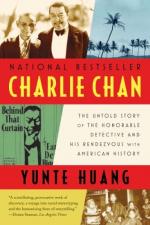|
This section contains 1,499 words (approx. 5 pages at 300 words per page) |

|
SOURCE: "Murder Number One," in The New Republic, Vol. 177, No. 3264, July 30, 1977, pp. 38-9.
In the following essay, Breen studies the development of Charlie Chan as a leading character in the six novels by Biggers.
With the exception of a couple of Dashiell Hammett characters, Sam Spade and Nick Charles, no character in detective fiction has become more famous on the basis of fewer official appearances than Earl Derr Biggers's Chinese sleuth Charlie Chan. The Honolulu policeman appeared in only six novels, beginning with The House Without a Key (1925), in which he is a comparatively minor character, and ending with The Keeper of the Keys (1932), by which time he has taken over center stage.
As with Spade and Charles, most of Chan's fame has been spread through hundreds of apocryphal cases in films, radio, television, and comic strips. As entertaining as many of these adaptations are, they have done...
|
This section contains 1,499 words (approx. 5 pages at 300 words per page) |

|


